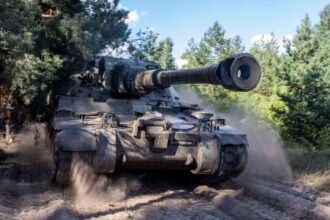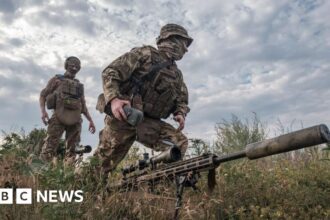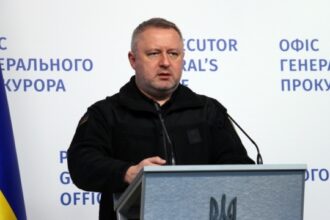Imagine you’re Vladimir Putin.
You have been branded a pariah by the West for invading Ukraine. Sanctions aim to cut off the economy of your country from global markets.
You’ve been issued an arrest warrant by the International Criminal Court.
How can you demonstrate that the pressure isn’t working? Try hosting a summit.
This week, President Putin will meet with more than 20 heads-of-state at the Brics Summit of emerging economies in Kazan. Among those invited are Xi Jinping of China, Indian Prime Minister NarendraModi and Iranian president Masoud Peshkian.
The Kremlin called it “the largest-scale foreign policy event ever” in Russia.
Chris Weafer is the founder of Macro-Advisory, a consultancy firm. He believes that “the clear message is that efforts to isolate Russia have failed”.
“It is a major part of the Kremlin’s message that Russia is able to withstand sanctions. We know that there are serious cracks under the surface. “But at a geopolitical scale, Russia has all of these friends who are all going to be Russia’s partners.”
Who are Russia’s allies?
Brics is an acronym for Brazil, Russia India China and South Africa. The grouping is often referred as a counterweight against the Western-led World. It now includes Egypt, Ethiopia and the United Arab Emirates.
Saudi Arabia has also been invited to join.
The Brics nations represent 45% of global population. The combined economies of the members are worth over $28.5tn. This is about 28% of global GDP.
Officials from Russia have stated that 30 more countries are interested in joining Brics, or seeking closer ties to the club. Some of these countries will participate in the summit. This week in Kazan, expect to hear a lot about Brics as the “global minority”.
What is the event likely achieve, other than giving Vladimir Putin a moment on the world stage?
Kremlin leader hopes to convince Brics member countries to adopt an alternative payment system to the dollar.
“Many of the problems Russia faces in its economy are related to cross-border payments and trade.” “And a lot of it is linked to the US Dollar,” says Mr Weafer.
“The US Treasury has enormous influence and power over global trade, simply because the US Dollar is the main currency used to settle that. Russia’s primary interest is to break the dominance of US dollars. It wants Brics nations to create a cross-border settlement and alternative trade system that doesn’t involve the dollar, euro, or any of G7 currencies so that sanctions don’t matter as much.”
Critics point out differences within Brics. You would not describe the current membership as “likeminded”.
“In a way, it’s good for the West that China cannot and will not agree on anything. If these two were serious, Brics could have a huge influence, says Jim O’Neill. Former Chief Economist at Goldman Sachs.
“China and India try to avoid each other’s attacks as much as possible.” It’s a never-ending task to get them to work together on economic issues.
Mr O’Neill was the one who coined the acronym “BRIC” at the turn-of-the century for four emerging economies he thought should be “brought to the centre of global decision making”.
The four letters took on a new life after the corresponding countries formed their own Bric groups – later Brics when South Africa joined. They would try to challenge the dominance the G7, the world’s largest “advanced economies” (Canada, France Germany, Italy, Japan UK and US).
Not only India and China have their differences. Egypt and Ethiopia, two of the newest Brics member countries, are at odds. Iran and Saudi Arabia are regional rivals despite the talk of detente.
“The idea that everyone will agree on something fundamentally great is bonkers,” says Mr O’Neill.
While Russia, fueled by anti-Western sentiments, talks about creating “a new world order”, other Brics member countries, such as India, are keen on maintaining good political and economic relationships with the West.
In Kazan, Vladimir Putin will have to look past the differences, and paint a picture that is united, showing the Russian people – and the rest of the world – that Russia is not isolated.
Published 1 day ago
Published on 15 July
* Published 12 Hours Ago
* Published 7 Hours Ago
Published 1 hour ago
Published 7 hours ago
Read More @ www.bbc.com




